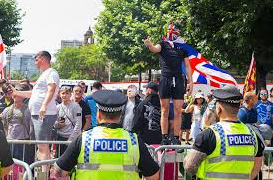
Tensions rise following the tragic killing of three young girls in Merseyside and widespread unrest in multiple cities
Riot police clashed with protesters in various UK cities on Saturday as ministers convened to discuss the possibility of further disturbances in the wake of recent violent protests. The demonstrations were sparked by the tragic deaths of three young girls at a Taylor Swift-themed holiday club in Southport, Merseyside, earlier in the week. Axel Muganwa Rudakubana, 17, is accused of the killings, but false claims circulated online, suggesting the suspect was an asylum seeker who had arrived by boat.
On Saturday, protests erupted in cities such as Liverpool, Stoke-on-Trent, Belfast, and Hull, with tensions running high. In Liverpool, violent confrontations led to several injuries among police officers, including one hit on the head by a chair and others targeted with bricks and bottles. Riot shields were kicked, and another officer was knocked off his motorcycle by a protester. In Stoke-on-Trent, bricks were thrown, while Belfast saw fireworks hurled during clashes between anti-Islamic and anti-racism protesters. In Hull, windows were smashed at a hotel housing migrants.
Greater Manchester Police imposed a dispersal notice for the city centre, while Merseyside Police increased stop-and-search powers in response to the growing unrest. Protests in Nottingham and Leeds involved opposing groups, with chants of “England till I die” and “Nazi scum off our streets” filling the air. In Leeds, around 150 people waving St George flags were vastly outnumbered by counter-protesters.
As the disturbances continued, the social media platform TikTok blocked the search for the term “Tommy Robinson,” the far-right figure at the centre of some protests. Cleveland Police dismissed claims that the organiser of a Middlesbrough march had been arrested on terrorism charges, stating that the individual was detained for firearms offences.
This series of protests follows the “unforgivable” violence in Sunderland, where a Citizens Advice office was set on fire, and a gravestone was reportedly targeted by vandals. Lewis Atkinson, Labour MP for Sunderland Central, suggested a connection between the violence and the far-right English Defence League (EDL), which was founded by Tommy Robinson, whose real name is Stephen Yaxley-Lennon.
There have been growing concerns about the impact of far-right extremism, with MPs from across the political spectrum condemning the disorder that has gripped cities like London, Manchester, Southport, and Hartlepool. Cleveland Police reported the arrest of two boys, aged 11 and 14, for violent disorder in Hartlepool, where a police station was set on fire, and a mosque was attacked.
Northumbria Police confirmed that four officers were injured during the Sunderland violence, and 10 people have been arrested. Police have warned that those responsible for the disorder should expect severe consequences, with Mark Hall, Chief Superintendent, stating that this was “unforgivable violence.”
Concerns have also been raised within the Muslim community about the far-right groups behind the protests. Qari Asim, chairman of the Mosques and Imams National Advisory Board, expressed deep anxiety over the demonstrations planned across the country.
To manage the unrest, an additional 70 prosecutors have been put on standby, and more than 30 events have been identified by the Hope Not Hate campaign group. Thousands of people gathered in Southport earlier this week to pay tribute to the three young girls who lost their lives, but the mourning was overshadowed by violent protests outside a mosque, leaving 53 police officers injured.
Prime Minister Sir Keir Starmer condemned the “thugs” who came to Southport to stir up unrest, calling the violence the greatest challenge of his premiership. The scale of the disorder has drawn comparisons to the 2011 riots, which were sparked by the police shooting of Mark Duggan in Tottenham Hale, North London.










